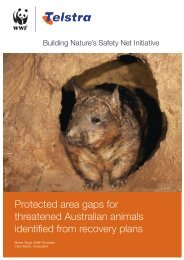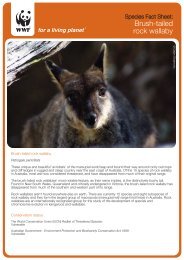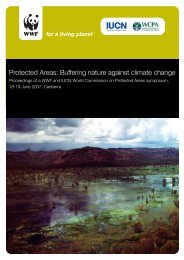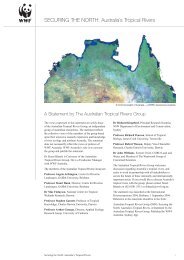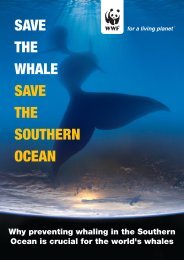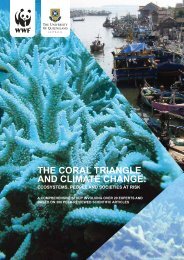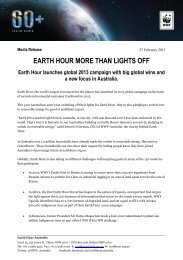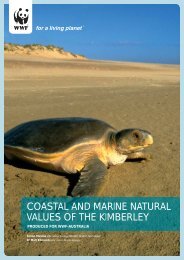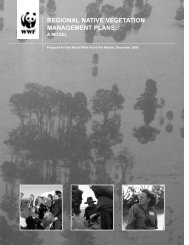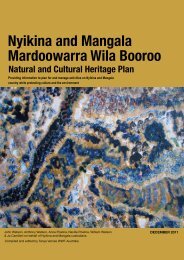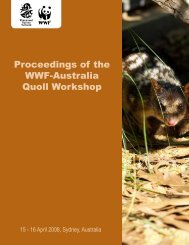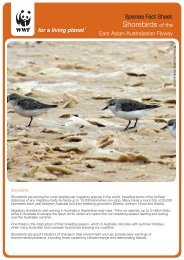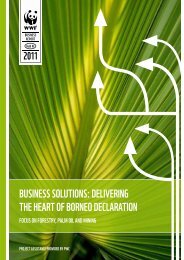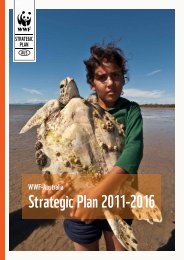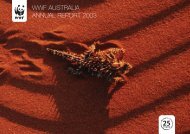Indigenous Peoples and Conservation Organizations
Indigenous Peoples and Conservation Organizations
Indigenous Peoples and Conservation Organizations
You also want an ePaper? Increase the reach of your titles
YUMPU automatically turns print PDFs into web optimized ePapers that Google loves.
130 The Ju/’hoan in Namibia<br />
5.1 Legislation to grant rights to select<br />
resources can be self-defeating if collective<br />
communal units do not also have or<br />
receive strong property rights to the<br />
l<strong>and</strong> itself.<br />
In Namibia the conservancy legislation clearly<br />
stipulates that the community does not have<br />
rights over the l<strong>and</strong>, only usufruct rights over<br />
some of the wildlife <strong>and</strong> the benefits derived<br />
from them. This creates a double bind. The<br />
official policy to decentralize wildlife management<br />
by h<strong>and</strong>ing it over to the local community<br />
is subverted by denying the community the<br />
secure tenure it needs to maintain sustainable<br />
game populations. For example, in Nyae Nyae<br />
the community has no legal authority to prevent<br />
the Herero from moving again into the conservancy<br />
to graze their cattle. There is no guarantee<br />
what will happen if government turns a blind<br />
eye. Unless the conservancy is grounded in<br />
secure tenure, it will be in constant danger.<br />
The lack of comprehensive legislation is not simply<br />
a question of the state trying to retain final<br />
authority. It also points to how policy reform is<br />
rarely coordinated, <strong>and</strong> how the state often<br />
speaks with more than one voice. Although senior<br />
policy makers at the MET are aware of the<br />
double bind, the agency lacks the power to<br />
address it directly. It has chosen instead to work<br />
closely with local NGOs to play a prominent role<br />
in developing an NGO position paper to clarify<br />
<strong>and</strong> sharpen the public debate on l<strong>and</strong> reform.<br />
International conservation NGOs can support<br />
policy analysis necessary for reform <strong>and</strong> provide<br />
this information to the advocates of change. The<br />
LIFE Program supported a critique of the conservancy<br />
legislation by the University of Namibia<br />
<strong>and</strong> outreach activities by others.<br />
5.2 Legislation is hollow without the<br />
resources, skills, <strong>and</strong> political will for<br />
implementation.<br />
By almost any st<strong>and</strong>ard, the legislation in<br />
Namibia is progressive—it gives local communities<br />
the authority to manage <strong>and</strong> benefit from<br />
their resources. What sounds good, however,<br />
may not be good in practice. In Nyae Nyae the<br />
MET lacks the financial <strong>and</strong> human resources to<br />
carry their share of the load, which threatens to<br />
undermine the building of an effective partnership<br />
with the community. MET’s local branch<br />
staff is frequently unable to meet its commitments<br />
to collect data or attend meetings.<br />
Indeed there are doubts about how fully committed<br />
the agency is to carrying out the legislation.<br />
A debate still rages within the ranks of MET<br />
between advocates of preservation <strong>and</strong> of community-based<br />
natural resource management. Senior<br />
officials talk the new talk. But field staff tend to<br />
change attitudes only with the addition of new<br />
personnel when holdovers leave by attrition,<br />
rather than through some systematic process. The<br />
MET has yet to change job descriptions, performance<br />
criteria, <strong>and</strong> training procedures to support<br />
CBNRM, <strong>and</strong> many field staff lack the skills <strong>and</strong><br />
experience necessary to work with the community.<br />
As one MET official casually stated, “I took<br />
this job because I wanted to be alone in the bush<br />
with the wildlife, not to work with communities.”<br />
This debate exists within many conservation<br />
institutions, <strong>and</strong> will not be easily resolved. Yet<br />
unless change occurs throughout an institution,<br />
the h<strong>and</strong>ful of dreamers <strong>and</strong> visionaries who<br />
speak for the organization will be unable to shift<br />
its approach <strong>and</strong> philosophy on the ground.<br />
International conservation NGOs can support<br />
training—targeted at both field staff <strong>and</strong> national<br />
policy makers—as well as create forums for policy<br />
debate. <strong>Conservation</strong> NGOs are in a position<br />
to see the big picture <strong>and</strong> address an institution as<br />
a whole, rather than argue a narrow point of view<br />
shaped by the interests of patrons or the guarding<br />
of bureaucratic turf. However seeing the big picture<br />
<strong>and</strong> offering help is not always enough.<br />
Namibia illustrates the paradox that can ensue.<br />
LIFE’s attempts to address the lack of political<br />
will within MET were met by indifference to the<br />
opportunities for change offered by the program.<br />
Training works only if the institution wants its<br />
people trained <strong>and</strong> if the staff is open to new<br />
ideas <strong>and</strong> approaches. The challenge for conservation<br />
organizations in finding ways of encouraging<br />
institutional reform <strong>and</strong> capacity building is<br />
not simply a question of finding <strong>and</strong> distributing<br />
the right manual. One must work closely with<br />
staff <strong>and</strong> design efforts that are adapted to the<br />
specific circumstances at h<strong>and</strong>.



